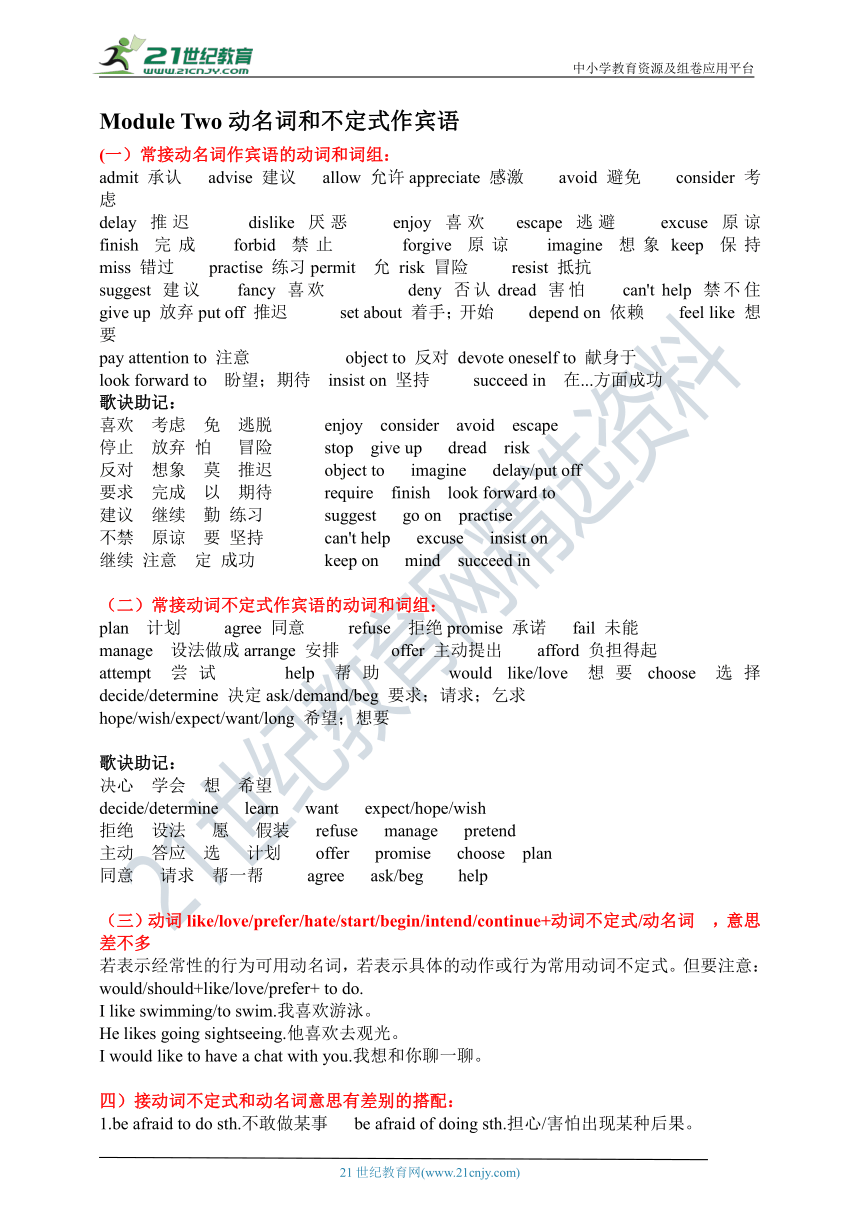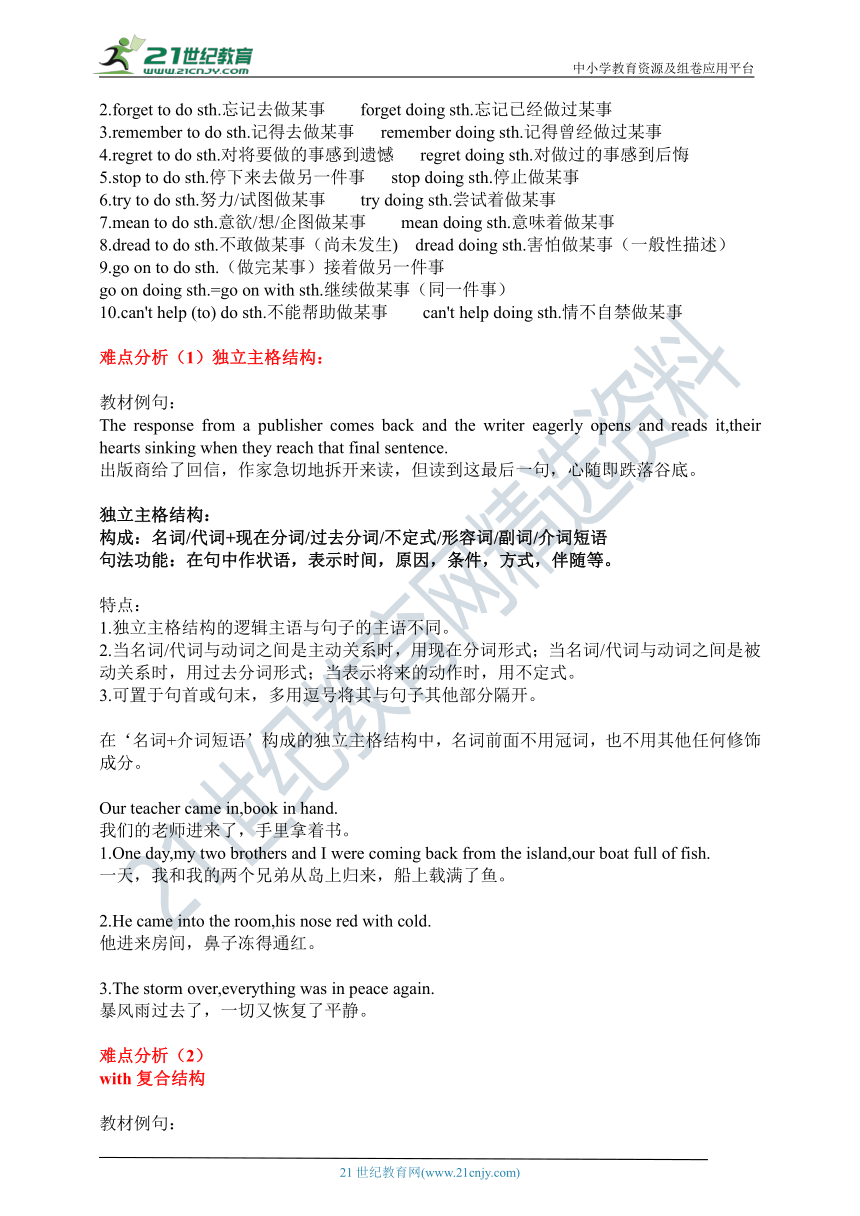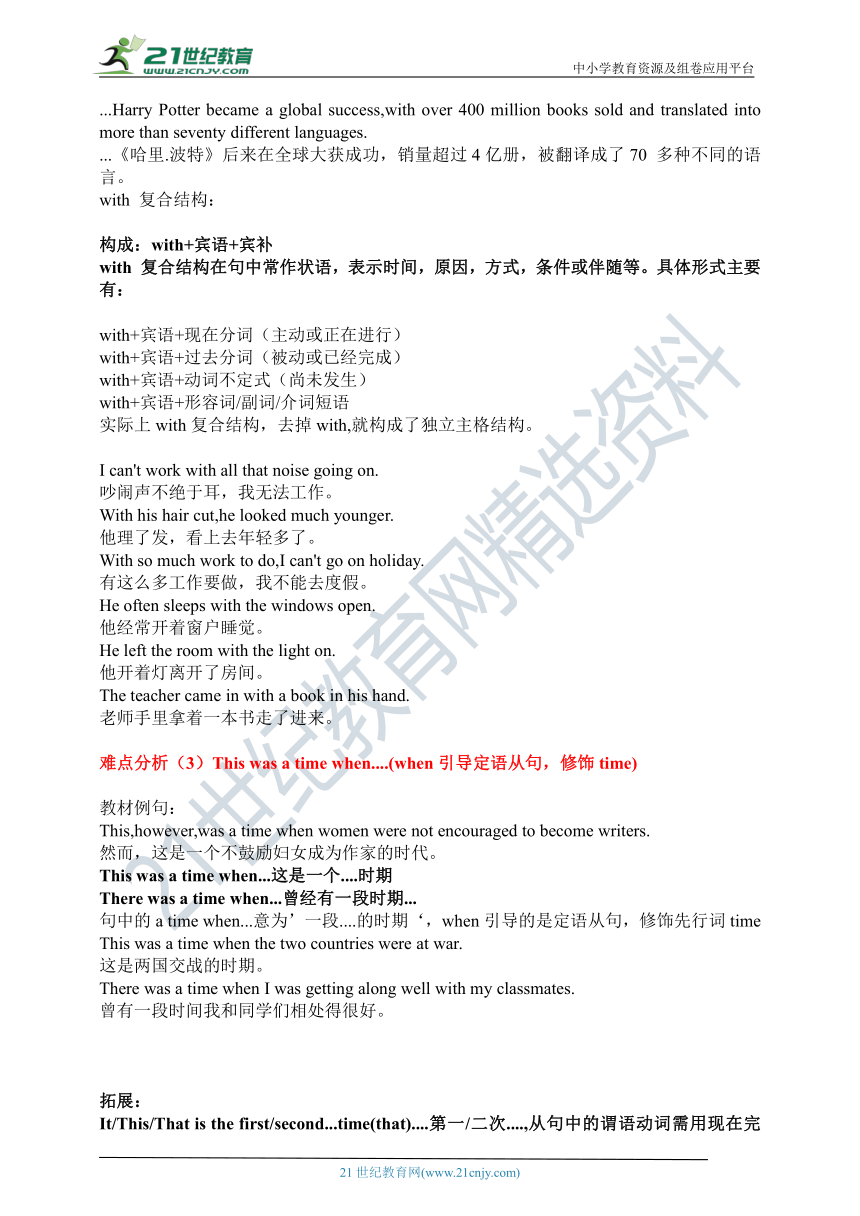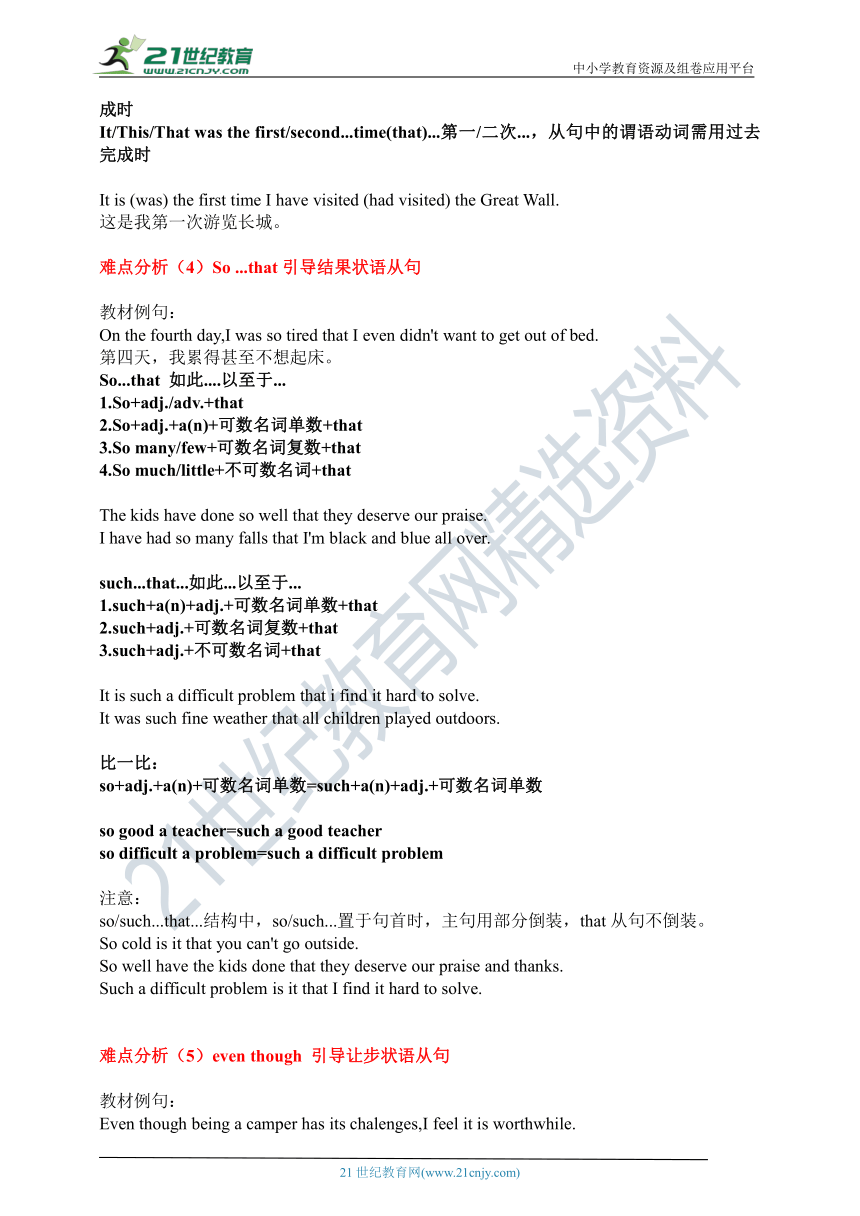(2019外研版)选修一unit 2 Onwards and upwards 讲义
文档属性
| 名称 | (2019外研版)选修一unit 2 Onwards and upwards 讲义 |  | |
| 格式 | zip | ||
| 文件大小 | 1.2MB | ||
| 资源类型 | 试卷 | ||
| 版本资源 | 外研版(2019) | ||
| 科目 | 英语 | ||
| 更新时间 | 2022-03-10 12:17:47 | ||
图片预览




文档简介
中小学教育资源及组卷应用平台
Module Two动名词和不定式作宾语
(一)常接动名词作宾语的动词和词组:
admit 承认 advise 建议 allow 允许appreciate 感激 avoid 避免 consider 考虑
delay 推迟 dislike 厌恶 enjoy 喜欢 escape 逃避 excuse 原谅 finish 完成 forbid 禁止 forgive 原谅 imagine 想象keep 保持 miss 错过 practise 练习permit 允 risk 冒险 resist 抵抗
suggest 建议 fancy 喜欢 deny 否认dread 害怕 can't help 禁不住 give up 放弃put off 推迟 set about 着手;开始 depend on 依赖 feel like 想要
pay attention to 注意 object to 反对 devote oneself to 献身于
look forward to 盼望;期待 insist on 坚持 succeed in 在...方面成功
歌诀助记:
喜欢 考虑 免 逃脱 enjoy consider avoid escape
停止 放弃 怕 冒险 stop give up dread risk
反对 想象 莫 推迟 object to imagine delay/put off
要求 完成 以 期待 require finish look forward to
建议 继续 勤 练习 suggest go on practise
不禁 原谅 要 坚持 can't help excuse insist on
继续 注意 定 成功 keep on mind succeed in
(二)常接动词不定式作宾语的动词和词组:
plan 计划 agree 同意 refuse 拒绝promise 承诺 fail 未能
manage 设法做成arrange 安排 offer 主动提出 afford 负担得起
attempt 尝试 help 帮助 would like/love 想要choose 选择 decide/determine 决定ask/demand/beg 要求;请求;乞求
hope/wish/expect/want/long 希望;想要
歌诀助记:
决心 学会 想 希望
decide/determine learn want expect/hope/wish
拒绝 设法 愿 假装 refuse manage pretend
主动 答应 选 计划 offer promise choose plan
同意 请求 帮一帮 agree ask/beg help
(三)动词like/love/prefer/hate/start/begin/intend/continue+动词不定式/动名词 ,意思差不多
若表示经常性的行为可用动名词,若表示具体的动作或行为常用动词不定式。但要注意:would/should+like/love/prefer+ to do.
I like swimming/to swim.我喜欢游泳。
He likes going sightseeing.他喜欢去观光。
I would like to have a chat with you.我想和你聊一聊。
四)接动词不定式和动名词意思有差别的搭配:
1.be afraid to do sth.不敢做某事 be afraid of doing sth.担心/害怕出现某种后果。
2.forget to do sth.忘记去做某事 forget doing sth.忘记已经做过某事
3.remember to do sth.记得去做某事 remember doing sth.记得曾经做过某事
4.regret to do sth.对将要做的事感到遗憾 regret doing sth.对做过的事感到后悔
5.stop to do sth.停下来去做另一件事 stop doing sth.停止做某事
6.try to do sth.努力/试图做某事 try doing sth.尝试着做某事
7.mean to do sth.意欲/想/企图做某事 mean doing sth.意味着做某事
8.dread to do sth.不敢做某事(尚未发生) dread doing sth.害怕做某事(一般性描述)
9.go on to do sth.(做完某事)接着做另一件事
go on doing sth.=go on with sth.继续做某事(同一件事)
10.can't help (to) do sth.不能帮助做某事 can't help doing sth.情不自禁做某事
难点分析(1)独立主格结构:
教材例句:
The response from a publisher comes back and the writer eagerly opens and reads it,their hearts sinking when they reach that final sentence.
出版商给了回信,作家急切地拆开来读,但读到这最后一句,心随即跌落谷底。
独立主格结构:
构成:名词/代词+现在分词/过去分词/不定式/形容词/副词/介词短语
句法功能:在句中作状语,表示时间,原因,条件,方式,伴随等。
特点:
1.独立主格结构的逻辑主语与句子的主语不同。
2.当名词/代词与动词之间是主动关系时,用现在分词形式;当名词/代词与动词之间是被动关系时,用过去分词形式;当表示将来的动作时,用不定式。
3.可置于句首或句末,多用逗号将其与句子其他部分隔开。
在‘名词+介词短语’构成的独立主格结构中,名词前面不用冠词,也不用其他任何修饰成分。
Our teacher came in,book in hand.
我们的老师进来了,手里拿着书。
1.One day,my two brothers and I were coming back from the island,our boat full of fish.
一天,我和我的两个兄弟从岛上归来,船上载满了鱼。
2.He came into the room,his nose red with cold.
他进来房间,鼻子冻得通红。
3.The storm over,everything was in peace again.
暴风雨过去了,一切又恢复了平静。
难点分析(2)
with复合结构
教材例句:
...Harry Potter became a global success,with over 400 million books sold and translated into more than seventy different languages.
...《哈里.波特》后来在全球大获成功,销量超过4亿册,被翻译成了70 多种不同的语言。
with 复合结构:
构成:with+宾语+宾补
with 复合结构在句中常作状语,表示时间,原因,方式,条件或伴随等。具体形式主要有:
with+宾语+现在分词(主动或正在进行)
with+宾语+过去分词(被动或已经完成)
with+宾语+动词不定式(尚未发生)
with+宾语+形容词/副词/介词短语
实际上with复合结构,去掉with,就构成了独立主格结构。
I can't work with all that noise going on.
吵闹声不绝于耳,我无法工作。
With his hair cut,he looked much younger.
他理了发,看上去年轻多了。
With so much work to do,I can't go on holiday.
有这么多工作要做,我不能去度假。
He often sleeps with the windows open.
他经常开着窗户睡觉。
He left the room with the light on.
他开着灯离开了房间。
The teacher came in with a book in his hand.
老师手里拿着一本书走了进来。
难点分析(3)This was a time when....(when引导定语从句,修饰time)
教材例句:
This,however,was a time when women were not encouraged to become writers.
然而,这是一个不鼓励妇女成为作家的时代。
This was a time when...这是一个....时期
There was a time when...曾经有一段时期...
句中的a time when...意为’一段....的时期‘,when引导的是定语从句,修饰先行词time
This was a time when the two countries were at war.
这是两国交战的时期。
There was a time when I was getting along well with my classmates.
曾有一段时间我和同学们相处得很好。
拓展:
It/This/That is the first/second...time(that)....第一/二次....,从句中的谓语动词需用现在完成时
It/This/That was the first/second...time(that)...第一/二次...,从句中的谓语动词需用过去完成时
It is (was) the first time I have visited (had visited) the Great Wall.
这是我第一次游览长城。
难点分析(4)So ...that引导结果状语从句
教材例句:
On the fourth day,I was so tired that I even didn't want to get out of bed.
第四天,我累得甚至不想起床。
So...that 如此....以至于...
1.So+adj./adv.+that
2.So+adj.+a(n)+可数名词单数+that
3.So many/few+可数名词复数+that
4.So much/little+不可数名词+that
The kids have done so well that they deserve our praise.
I have had so many falls that I'm black and blue all over.
such...that...如此...以至于...
1.such+a(n)+adj.+可数名词单数+that
2.such+adj.+可数名词复数+that
3.such+adj.+不可数名词+that
It is such a difficult problem that i find it hard to solve.
It was such fine weather that all children played outdoors.
比一比:
so+adj.+a(n)+可数名词单数=such+a(n)+adj.+可数名词单数
so good a teacher=such a good teacher
so difficult a problem=such a difficult problem
注意:
so/such...that...结构中,so/such...置于句首时,主句用部分倒装,that从句不倒装。
So cold is it that you can't go outside.
So well have the kids done that they deserve our praise and thanks.
Such a difficult problem is it that I find it hard to solve.
难点分析(5)even though 引导让步状语从句
教材例句:
Even though being a camper has its chalenges,I feel it is worthwhile.
尽管作为一位露营者具有挑战性,但我觉得这是值得的。
even though=even if,引导让步状语从句
as though=as if好像 ,常引导表语从句或方式状语从句
Even though there is a common spirit among all music groups,they make very different music.
尽管所有的音乐团体都有一个共同的精神,但他们演奏的音乐却大不相同。
难点分析(6)should have done 本该做某事(而未做)
教材例句:
He thought the girl should have gone to the national competition instead.
他认为这个女孩本应该去参加这次全国比赛。
should have done 过去本应该做(而实际上未做)
shouldn't have done 过去本不该做(而实际上做了)
You should have set down his telephone number yesterday.
You shouldn't have gone without telling us.We were really concerned about you.
以上两者都含有责备的语气。
拓展:
must have done sth.过去一定做过某事
may/might have done sth.(过去)可能做过某事
can't/couldn't have done sth.不可能做过某事
could have done sth.本能够做某事;本可以做某事(而实际上未做)
needn't have done sth.本没有必要做某事(却做了)
need have done sth.本来需要做某事(而实际上未做)
难点分析(7)虚拟语气:
教材例句:
If she had,the school would have been well-known.
如果她参加了,学校就会出名了。
if可以省略,这时条件句要用倒装语序
虚拟语气:
与现在事实相反的虚拟语气
虚拟条件句:’过去式(be动词用were)
主句:would/could/might/should+动词原形
与将来事实相反的虚拟语气
虚拟条件句:1.过去式(be动词用were) 2.should+动词原形 3.were to+动词原形
主句:would/could/might/should+动词原形
与过去事实相反的虚拟语气
虚拟条件句:过去完成时(had+v.p.p.)
主句:would/could/might/should have done.
难点分析(8)
It would be a blessing if...如果...这将是一件幸事。
教材例句:
I have often thought it would be a blessing if each human being were stricken blind and deaf for a few days at some time during his early adult life.
我常常想,如果每个人在青年时期都有一段时间失明和失聪,那会是一件幸事。
拓展:
It would be+adj.+if...如果...那将是....的。
It would be great if you could....如果你能....,那就太好了。
It would be hightly appreciated if you could...如果你能....,我将万分感激
I think it would be good if they banned smoking in restaurants and cafes as well.
我觉得如果他们也禁止在餐馆和咖啡馆吸烟会很好。
It would be highly appreciated if you could grant me an opportunity of an interview.
如果您能给我一个面试的机会我将非常感激。
难点分析(9)Only+状语(从句)+部分倒装
教材例句:
Only when darkness had again descended upon me should I realize how much I had left unseen.
只有当黑暗再次降临时,我才意识到,我还有那么多没有看到。
only +状语(从句)+部分倒装
当'only+状语(从句)位于句首时,其他习惯于用部分倒装。
句型为:Only+状语/状语从句+连系动词be/助动词/情态动词+(主句)主语+其他
Only then did I recognize him.
直到那时我才认出他来。
Only in this way can we calm the little girl down.
只有这样我们才能使这个小女孩平静下来。
Only when he told me did I know the details of his trip.
只有当他告诉我时,我才知道他旅行的细节。
only修饰状语从句位于句首时,主句用部分倒装,从句本身不倒装。
only修饰主语时不倒装。
Only I am the right person you can turn to.
只有我才是你可以求助的人。
难点分析(10)as if引导方式状语从句
教材例句:
Use your eyes as if tomorrow you would be stricken blind.
要像明天即将失明一样去使用你的眼睛。
as if=as though引导的从句常用虚拟语气表示所述的情况与事实不符。
类型 as if 从句谓语
与现在事实不符 过去式(be动词用were)
与过去事实不符 had+过去分词
与将来事实不符 would/could/might/should+动词原形
as if引导的从句有时也可以用陈述语气,表示说话者认为从句所述的情况是事实。
He looked as if he was about to burst into tears.
他看上去好像要哭了。
as if 引导的方式状语从句有时可用省略形式。
结构:
as if+分词/不定式/形容词/介词短语等。
She stood at the door as if waiting for someone.她站在门口,好像在等人。
本单元重点词组
1.regret to do 遗憾(抱歉)去做某事
2.have...in common 有共同之处;有...相同特点
3.along the lines of 类似...这样的评价/称赞等
4.a total of 总数为...
5.play a part 起作用;扮演角色
6.appreciative of 感激;珍惜;赞赏
7.probe into 探究;细查
8.close in on 围住;接近
9.give one hint to sb.给某人提示/暗示
10.strains of 音乐的曲调或旋律
11.take for example 以...为例
12.stick...on...把...粘/贴在...上
13.turn...down 拒绝...调低;关小
14.within the pages of 在...书中
15.be stricken blind and deaf 失明;失聪
16.worthy of note 值得注意的;显著的
17.go about 着手做;从事
18.descend upon 降临到...上
19.the pageant of(历史事件的)缤纷场景
20.give up 停止;放弃;辞去;交出
21.stick to 坚持;粘住
22.all too often 时常;经常是
23.struggle to do sth.挣扎着做某事;奋力做某事
24.be encouraged to do sth.被鼓励做某事
25.be made up of 由...组成
26.have an effect on 对...有影响
e across (偶然)遇见;发现;理解;被弄懂(get across)
pete against 与...竞争
29.run for 参加竞选;持续;有效
30.contribute to 有助于;捐献;导致
31.make use of 使用;利用
32.in particular 尤其;特别
33.be applied to 应用于;施加于
34.knock over 打翻;撞倒
35.end up 死亡;结束;结果为...;以...结束
36.be aware of 知道
37.respond to 相应;对...作出回应
38.team up with 与...合作;与...协作
21世纪教育网 www.21cnjy.com 精品试卷·第 2 页 (共 2 页)
HYPERLINK "http://21世纪教育网(www.21cnjy.com)
" 21世纪教育网(www.21cnjy.com)
Module Two动名词和不定式作宾语
(一)常接动名词作宾语的动词和词组:
admit 承认 advise 建议 allow 允许appreciate 感激 avoid 避免 consider 考虑
delay 推迟 dislike 厌恶 enjoy 喜欢 escape 逃避 excuse 原谅 finish 完成 forbid 禁止 forgive 原谅 imagine 想象keep 保持 miss 错过 practise 练习permit 允 risk 冒险 resist 抵抗
suggest 建议 fancy 喜欢 deny 否认dread 害怕 can't help 禁不住 give up 放弃put off 推迟 set about 着手;开始 depend on 依赖 feel like 想要
pay attention to 注意 object to 反对 devote oneself to 献身于
look forward to 盼望;期待 insist on 坚持 succeed in 在...方面成功
歌诀助记:
喜欢 考虑 免 逃脱 enjoy consider avoid escape
停止 放弃 怕 冒险 stop give up dread risk
反对 想象 莫 推迟 object to imagine delay/put off
要求 完成 以 期待 require finish look forward to
建议 继续 勤 练习 suggest go on practise
不禁 原谅 要 坚持 can't help excuse insist on
继续 注意 定 成功 keep on mind succeed in
(二)常接动词不定式作宾语的动词和词组:
plan 计划 agree 同意 refuse 拒绝promise 承诺 fail 未能
manage 设法做成arrange 安排 offer 主动提出 afford 负担得起
attempt 尝试 help 帮助 would like/love 想要choose 选择 decide/determine 决定ask/demand/beg 要求;请求;乞求
hope/wish/expect/want/long 希望;想要
歌诀助记:
决心 学会 想 希望
decide/determine learn want expect/hope/wish
拒绝 设法 愿 假装 refuse manage pretend
主动 答应 选 计划 offer promise choose plan
同意 请求 帮一帮 agree ask/beg help
(三)动词like/love/prefer/hate/start/begin/intend/continue+动词不定式/动名词 ,意思差不多
若表示经常性的行为可用动名词,若表示具体的动作或行为常用动词不定式。但要注意:would/should+like/love/prefer+ to do.
I like swimming/to swim.我喜欢游泳。
He likes going sightseeing.他喜欢去观光。
I would like to have a chat with you.我想和你聊一聊。
四)接动词不定式和动名词意思有差别的搭配:
1.be afraid to do sth.不敢做某事 be afraid of doing sth.担心/害怕出现某种后果。
2.forget to do sth.忘记去做某事 forget doing sth.忘记已经做过某事
3.remember to do sth.记得去做某事 remember doing sth.记得曾经做过某事
4.regret to do sth.对将要做的事感到遗憾 regret doing sth.对做过的事感到后悔
5.stop to do sth.停下来去做另一件事 stop doing sth.停止做某事
6.try to do sth.努力/试图做某事 try doing sth.尝试着做某事
7.mean to do sth.意欲/想/企图做某事 mean doing sth.意味着做某事
8.dread to do sth.不敢做某事(尚未发生) dread doing sth.害怕做某事(一般性描述)
9.go on to do sth.(做完某事)接着做另一件事
go on doing sth.=go on with sth.继续做某事(同一件事)
10.can't help (to) do sth.不能帮助做某事 can't help doing sth.情不自禁做某事
难点分析(1)独立主格结构:
教材例句:
The response from a publisher comes back and the writer eagerly opens and reads it,their hearts sinking when they reach that final sentence.
出版商给了回信,作家急切地拆开来读,但读到这最后一句,心随即跌落谷底。
独立主格结构:
构成:名词/代词+现在分词/过去分词/不定式/形容词/副词/介词短语
句法功能:在句中作状语,表示时间,原因,条件,方式,伴随等。
特点:
1.独立主格结构的逻辑主语与句子的主语不同。
2.当名词/代词与动词之间是主动关系时,用现在分词形式;当名词/代词与动词之间是被动关系时,用过去分词形式;当表示将来的动作时,用不定式。
3.可置于句首或句末,多用逗号将其与句子其他部分隔开。
在‘名词+介词短语’构成的独立主格结构中,名词前面不用冠词,也不用其他任何修饰成分。
Our teacher came in,book in hand.
我们的老师进来了,手里拿着书。
1.One day,my two brothers and I were coming back from the island,our boat full of fish.
一天,我和我的两个兄弟从岛上归来,船上载满了鱼。
2.He came into the room,his nose red with cold.
他进来房间,鼻子冻得通红。
3.The storm over,everything was in peace again.
暴风雨过去了,一切又恢复了平静。
难点分析(2)
with复合结构
教材例句:
...Harry Potter became a global success,with over 400 million books sold and translated into more than seventy different languages.
...《哈里.波特》后来在全球大获成功,销量超过4亿册,被翻译成了70 多种不同的语言。
with 复合结构:
构成:with+宾语+宾补
with 复合结构在句中常作状语,表示时间,原因,方式,条件或伴随等。具体形式主要有:
with+宾语+现在分词(主动或正在进行)
with+宾语+过去分词(被动或已经完成)
with+宾语+动词不定式(尚未发生)
with+宾语+形容词/副词/介词短语
实际上with复合结构,去掉with,就构成了独立主格结构。
I can't work with all that noise going on.
吵闹声不绝于耳,我无法工作。
With his hair cut,he looked much younger.
他理了发,看上去年轻多了。
With so much work to do,I can't go on holiday.
有这么多工作要做,我不能去度假。
He often sleeps with the windows open.
他经常开着窗户睡觉。
He left the room with the light on.
他开着灯离开了房间。
The teacher came in with a book in his hand.
老师手里拿着一本书走了进来。
难点分析(3)This was a time when....(when引导定语从句,修饰time)
教材例句:
This,however,was a time when women were not encouraged to become writers.
然而,这是一个不鼓励妇女成为作家的时代。
This was a time when...这是一个....时期
There was a time when...曾经有一段时期...
句中的a time when...意为’一段....的时期‘,when引导的是定语从句,修饰先行词time
This was a time when the two countries were at war.
这是两国交战的时期。
There was a time when I was getting along well with my classmates.
曾有一段时间我和同学们相处得很好。
拓展:
It/This/That is the first/second...time(that)....第一/二次....,从句中的谓语动词需用现在完成时
It/This/That was the first/second...time(that)...第一/二次...,从句中的谓语动词需用过去完成时
It is (was) the first time I have visited (had visited) the Great Wall.
这是我第一次游览长城。
难点分析(4)So ...that引导结果状语从句
教材例句:
On the fourth day,I was so tired that I even didn't want to get out of bed.
第四天,我累得甚至不想起床。
So...that 如此....以至于...
1.So+adj./adv.+that
2.So+adj.+a(n)+可数名词单数+that
3.So many/few+可数名词复数+that
4.So much/little+不可数名词+that
The kids have done so well that they deserve our praise.
I have had so many falls that I'm black and blue all over.
such...that...如此...以至于...
1.such+a(n)+adj.+可数名词单数+that
2.such+adj.+可数名词复数+that
3.such+adj.+不可数名词+that
It is such a difficult problem that i find it hard to solve.
It was such fine weather that all children played outdoors.
比一比:
so+adj.+a(n)+可数名词单数=such+a(n)+adj.+可数名词单数
so good a teacher=such a good teacher
so difficult a problem=such a difficult problem
注意:
so/such...that...结构中,so/such...置于句首时,主句用部分倒装,that从句不倒装。
So cold is it that you can't go outside.
So well have the kids done that they deserve our praise and thanks.
Such a difficult problem is it that I find it hard to solve.
难点分析(5)even though 引导让步状语从句
教材例句:
Even though being a camper has its chalenges,I feel it is worthwhile.
尽管作为一位露营者具有挑战性,但我觉得这是值得的。
even though=even if,引导让步状语从句
as though=as if好像 ,常引导表语从句或方式状语从句
Even though there is a common spirit among all music groups,they make very different music.
尽管所有的音乐团体都有一个共同的精神,但他们演奏的音乐却大不相同。
难点分析(6)should have done 本该做某事(而未做)
教材例句:
He thought the girl should have gone to the national competition instead.
他认为这个女孩本应该去参加这次全国比赛。
should have done 过去本应该做(而实际上未做)
shouldn't have done 过去本不该做(而实际上做了)
You should have set down his telephone number yesterday.
You shouldn't have gone without telling us.We were really concerned about you.
以上两者都含有责备的语气。
拓展:
must have done sth.过去一定做过某事
may/might have done sth.(过去)可能做过某事
can't/couldn't have done sth.不可能做过某事
could have done sth.本能够做某事;本可以做某事(而实际上未做)
needn't have done sth.本没有必要做某事(却做了)
need have done sth.本来需要做某事(而实际上未做)
难点分析(7)虚拟语气:
教材例句:
If she had,the school would have been well-known.
如果她参加了,学校就会出名了。
if可以省略,这时条件句要用倒装语序
虚拟语气:
与现在事实相反的虚拟语气
虚拟条件句:’过去式(be动词用were)
主句:would/could/might/should+动词原形
与将来事实相反的虚拟语气
虚拟条件句:1.过去式(be动词用were) 2.should+动词原形 3.were to+动词原形
主句:would/could/might/should+动词原形
与过去事实相反的虚拟语气
虚拟条件句:过去完成时(had+v.p.p.)
主句:would/could/might/should have done.
难点分析(8)
It would be a blessing if...如果...这将是一件幸事。
教材例句:
I have often thought it would be a blessing if each human being were stricken blind and deaf for a few days at some time during his early adult life.
我常常想,如果每个人在青年时期都有一段时间失明和失聪,那会是一件幸事。
拓展:
It would be+adj.+if...如果...那将是....的。
It would be great if you could....如果你能....,那就太好了。
It would be hightly appreciated if you could...如果你能....,我将万分感激
I think it would be good if they banned smoking in restaurants and cafes as well.
我觉得如果他们也禁止在餐馆和咖啡馆吸烟会很好。
It would be highly appreciated if you could grant me an opportunity of an interview.
如果您能给我一个面试的机会我将非常感激。
难点分析(9)Only+状语(从句)+部分倒装
教材例句:
Only when darkness had again descended upon me should I realize how much I had left unseen.
只有当黑暗再次降临时,我才意识到,我还有那么多没有看到。
only +状语(从句)+部分倒装
当'only+状语(从句)位于句首时,其他习惯于用部分倒装。
句型为:Only+状语/状语从句+连系动词be/助动词/情态动词+(主句)主语+其他
Only then did I recognize him.
直到那时我才认出他来。
Only in this way can we calm the little girl down.
只有这样我们才能使这个小女孩平静下来。
Only when he told me did I know the details of his trip.
只有当他告诉我时,我才知道他旅行的细节。
only修饰状语从句位于句首时,主句用部分倒装,从句本身不倒装。
only修饰主语时不倒装。
Only I am the right person you can turn to.
只有我才是你可以求助的人。
难点分析(10)as if引导方式状语从句
教材例句:
Use your eyes as if tomorrow you would be stricken blind.
要像明天即将失明一样去使用你的眼睛。
as if=as though引导的从句常用虚拟语气表示所述的情况与事实不符。
类型 as if 从句谓语
与现在事实不符 过去式(be动词用were)
与过去事实不符 had+过去分词
与将来事实不符 would/could/might/should+动词原形
as if引导的从句有时也可以用陈述语气,表示说话者认为从句所述的情况是事实。
He looked as if he was about to burst into tears.
他看上去好像要哭了。
as if 引导的方式状语从句有时可用省略形式。
结构:
as if+分词/不定式/形容词/介词短语等。
She stood at the door as if waiting for someone.她站在门口,好像在等人。
本单元重点词组
1.regret to do 遗憾(抱歉)去做某事
2.have...in common 有共同之处;有...相同特点
3.along the lines of 类似...这样的评价/称赞等
4.a total of 总数为...
5.play a part 起作用;扮演角色
6.appreciative of 感激;珍惜;赞赏
7.probe into 探究;细查
8.close in on 围住;接近
9.give one hint to sb.给某人提示/暗示
10.strains of 音乐的曲调或旋律
11.take for example 以...为例
12.stick...on...把...粘/贴在...上
13.turn...down 拒绝...调低;关小
14.within the pages of 在...书中
15.be stricken blind and deaf 失明;失聪
16.worthy of note 值得注意的;显著的
17.go about 着手做;从事
18.descend upon 降临到...上
19.the pageant of(历史事件的)缤纷场景
20.give up 停止;放弃;辞去;交出
21.stick to 坚持;粘住
22.all too often 时常;经常是
23.struggle to do sth.挣扎着做某事;奋力做某事
24.be encouraged to do sth.被鼓励做某事
25.be made up of 由...组成
26.have an effect on 对...有影响
e across (偶然)遇见;发现;理解;被弄懂(get across)
pete against 与...竞争
29.run for 参加竞选;持续;有效
30.contribute to 有助于;捐献;导致
31.make use of 使用;利用
32.in particular 尤其;特别
33.be applied to 应用于;施加于
34.knock over 打翻;撞倒
35.end up 死亡;结束;结果为...;以...结束
36.be aware of 知道
37.respond to 相应;对...作出回应
38.team up with 与...合作;与...协作
21世纪教育网 www.21cnjy.com 精品试卷·第 2 页 (共 2 页)
HYPERLINK "http://21世纪教育网(www.21cnjy.com)
" 21世纪教育网(www.21cnjy.com)
